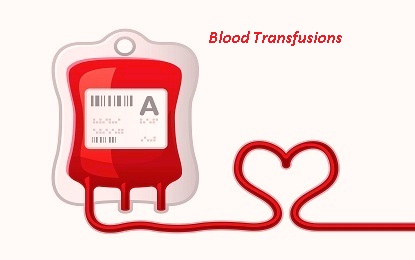Blood Transfusions Expectations and How Long Treatment Last
How much time blood transfusion take?
Blood transfusions normally take 1 hour to 4 hours of time. Transfusion of blood involves blood from a donor via an intravenous (IV) lines. Sometimes, a patient may receive his/her own blood if it was collected previously by blood banks or doctor.
Few peoples need the regular blood transfusions to help with the medical conditions. A guideline for blood transfusion says that it should take a couple of hours or a maximum of fours hours. This is to prevent the blood from becoming unsafe, infected and damaged.
Click here to read:- 10 Natural and Reliable Home Remedies for Earache
Click Here To Buy the Most Valuable Product in the Problem of Acidity
If a patient needs blood in an emergency situation, then the patient may receive the blood more quickly than a normal requirement. It helps in saving the life of a patient who loses significant blood and required blood immediately. Blood for surgeries and injuries that cause a high amount of blood can be called emergency.
What are the expectations required during the process before blood transfusion?
In severe chronic medical condition cases, the doctor can order a blood test which is called a complete blood count (CBC) to check if a patient required a blood transfusion. This test takes very few minutes for blood to be drawn for this particular test. Results for this test take a few hours to a daytime. Sometimes the situation of the patient is very serious and required emergency then the doctor will act before waiting for the results of the CBC blood test.
Type of Blood
Once your doctor confirms that patient needs a blood transfusion than a medical professional or doctor will draw another blood sample. The taken sample will send to a lab for the test which is known as blood typing and crossing. This testing takes just a few minutes to complete. Know about patients blood groups and other queries are very important. This test ensures the type of blood doctors gives to the patient is a match.
What after typed blood?
Your identity and all the information will be checked to ensure that you are given the correct blood. If patient doesn’t already have an IV test, the medical professional or doctor will start IV lines and administer the blood through this line.
First 15 minutes of blood transfusion
A nurse will remain with the patient for at least the first 15 minutes or so for the blood transfusion. This is because most of the reaction with blood transfusions (if happens) occurs immediately.
Examples of blood transfusion reactions include:-
Reactions fro blood transfusion may cause fever, itching, chills, difficulty in breathing and back pain. If these symptoms happen to the patient the blood transfusion will be stopped immediately.
Click here to read:- You Should Know About These Top 10 Incurable Diseases
Between one to four hours of time
If a patient does not have a reaction, the nurse or medical officer may raise the rate of blood transfusion. If patient has a condition which can affect the ability of the body to maintain the balance of fluids, such as congestive heart failure than the blood transfusion may be slower.
Over this course of blood transfusion, nurse or doctor will check the patient’s vital signs frequently. They will check heart rate, blood pressure, and temperature.
After fours hours time
If patient bleeding continuously then the blood transfusion will last as long as patient bleeding. If patient has gastrointestinal bleeding or losing blood while the surgery, then the doctor, will try to keep up with the blood amount loss and replace the blood as much needed.
When will the patient start feeling the effects of blood transfusion?
Feeling the effects of the blood transfusion can depend on your overall health, the amount of blood patient started with, why patient need the transfusion.
Normally, the patient starts feeling better immediately after receiving the blood transfusion because the blood is better able to function as it should. More often, doctors will order the follow-up CBC about an hour after the blood transfusion to determine how this transfusion helped the patient.
If patient has a condition where patient actively losing the blood, such as gastrointestinal bleeding then the doctor will often needs to treat the patient’s condition underlying cause before blood transfusions will have its full effects.
Mostly reactions from blood transfusion react immediately but there are some longer-term risks also associated with blood transfusions. It is the doctor’s duty to monitor the patient in both of the conditions.
Click here to read:- Swelling in Bones and their 8 Treatments
How long does a blood transfusion treatment last?
Blood transfusions normally intended to support the body of patient until the conditions setting normal and the body of a patient start making blood again. A healthy body makes millions of new cells every minute. How long the treatment takes is depends on why the patient needs transfusions.
The doctor checks the patient time to time and then continuing the blood transfusions to maintain the exact amount of blood and components in the patient’s body. If your doctor is able to correct the above-written problems then the patient’s body will be ideally able to take over. After that, you do not need any further blood transfusions.

